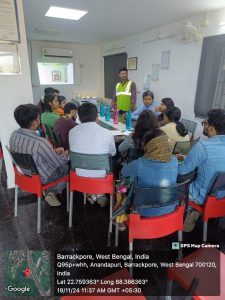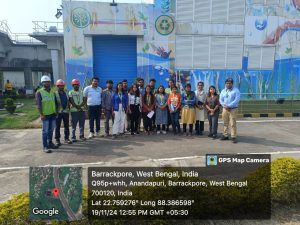B.Sc. Environmental Science and Sustainability
Introduction
The four-year B.Sc. Environmental Science and Sustainability programme, aligned with the NEP 2020 guidelines, offers a multidisciplinary curriculum that provides students with the tools and knowledge to address critical environmental challenges. This programme integrates science, technology, and policy to develop solutions for climate change, pollution control, biodiversity conservation, and sustainable resource management. It emphasizes practical, real-world problem-solving to prepare students for impactful careers in environmental science and sustainability.
Why Study Environmental Science and Sustainability?
- Rising Career Demand: A 6% global job growth rate for environmental science professionals (2022–2032), as reported by the US Bureau of Labor Statistics, highlights this field as one of the fastest-growing.
- Address Global Challenges: With increasing concerns over climate change, pollution, biodiversity loss, and resource depletion, skilled professionals are more crucial than ever.
- Placement Success: All alumni have been successfully placed in leading organizations and industries through campus placement drives.
- Future-Ready Skills: The programme equips students with cutting-edge skills in ESG analysis, sustainability, climate resilience, and pollution mitigation to meet current and future industry needs.
Programme Focus Areas
The curriculum focuses on the following key areas:
- Climate Change Adaptation and Mitigation
- Environmental Pollution Management (Air, Water, and Soil)
- Sustainability Reporting and ESG Frameworks
- Biodiversity Conservation and Natural Resource Management
- Renewable Energy and Carbon Credit Mechanisms
- Environmental Modelling and Statistical Applications
- Public Health and Hygiene
- Occupational Health, Safety, and Environment (OHSE)
Industry Internships
The programme includes mandatory industry internships to provide students with real-world exposure to environmental challenges and solutions. Past internships include:
- TATA Power
- TATA Steel
- Indorama Corporation
- Ultratech Environmental Consultancy
- Consultivo - ESG and Sustainability Consulting Firm
These internships offer hands-on experience in areas like sustainability, ESG, pollution monitoring, renewable energy, environmental compliance, and wastewater management, enhancing employability and industry readiness.
Field Study and Ecology Workshops
Field Studies
Field studies form an integral part of the B.Sc. Environmental Science and Sustainability program, offering students hands-on exposure to real-world environmental scenarios. Through guided field visits to forests, wetlands, river basins, industrial sites, and agricultural landscapes, students:
- Apply theoretical knowledge to assess ecological health, biodiversity, and environmental quality.
- Conduct surveys and collect environmental samples such as soil, water, and air for further laboratory analysis.
- Gain insights into sustainable resource management and conservation practices.
Examples of Field Studies Include:
- Biodiversity Surveys: Exploring flora and fauna diversity in biodiversity hotspots.
- Pollution Monitoring: Sampling and analyzing air and water quality in industrial and urban areas.
- Climate Resilience Studies: Understanding the impact of climate change on ecosystems and communities.
- Agriculture and Sustainable Land Use: Visiting organic farms and agroforestry systems.
Ecology Workshops
Ecology workshops are designed to deepen students’ understanding of ecological principles and practical skills in environmental monitoring and management. These workshops include:
- Biodiversity Monitoring Techniques: Learning methods like quadrat sampling, point counts, and camera trapping.
- GIS and Mapping for Ecological Studies: Introduction to geospatial tools for habitat mapping and landscape analysis.
- Ecosystem Restoration Practices: Understanding reforestation, wetland restoration, and habitat reconstruction.
- Conservation Strategies: Workshops on species management, protected area design, and wildlife corridors.
- Community-Based Conservation: Engaging with local communities to study traditional knowledge and sustainable practices.
Career Opportunities
Graduates of B.Sc. Environmental Science and Sustainability are equipped for diverse career paths, including:
In Industry:
- Sustainability Officer
- ESG Analyst
- Climate Change Consultant
- Pollution Control Specialist
- Environmental Consultant (EIA, EH&S)
- Green Technologist
- GIS Analyst or Land Use Planner
- Water and Wastewater Treatment Manager
In Government:
- Indian/State Forest Services
- Central and State Pollution Control Boards
- Environmental Law Consultant (National Green Tribunal)
- Energy and Environmental Auditor
- Specialist in Waste Management or Contaminant Cleanup
Other Roles:
- Environmental Journalist
- Public Health Coordinator
- Researcher in Environmental Modelling and Data Analysis
Interdisciplinary nature of this subject offers a plethora of job opportunities with active help of career development cell (CDC) of our university.
Programme Educational Objectives (PEO):
PEO1: The graduates will establish themselves as global professionals by addressing environmental challenges using advanced scientific knowledge, sustainability principles, and analytical skills gained in the field of Environmental Science and Sustainability.
PEO2: The graduates will develop innovative, eco-friendly, and cost-effective solutions to pressing environmental issues by integrating interdisciplinary research, entrepreneurship, and sustainable practices.
PEO3: The graduates will become employable in diverse sectors such as ESG, climate change, pollution management, and sustainability, through collaborations between academia and industry, and by acquiring sector-specific competencies.
PEO4: The graduates will demonstrate ethical responsibility, professional integrity, and social consciousness while offering sustainable and equitable solutions to global and local environmental problems.
PEO5: The graduates will contribute to policy-making, research, and community engagement, promoting the values of environmental stewardship and long-term sustainable development.
Programme Outcomes (POs):
PO1: Critical Thinking: Analyze environmental problems using interdisciplinary approaches, identify assumptions, and formulate innovative, science-backed solutions for local and global sustainability challenges.
PO2: Effective Communication: Communicate effectively through written, oral, and digital media with diverse stakeholders, including scientists, policymakers, industries, and communities, to advocate for environmental sustainability.
PO3: Teamwork and Social Interaction: Collaborate with multidisciplinary teams to mediate discussions, resolve disagreements, and achieve consensus on environmental projects and sustainability initiatives.
PO4: Effective Citizenship: Demonstrate a commitment to environmental ethics, equity, and inclusivity, participating in civic activities and contributing to national and global sustainable development goals (SDGs).
PO5: Ethics and Accountability: Recognize ethical dilemmas in environmental decision-making, accept responsibility for the consequences of actions, and promote sustainability-oriented value systems.
PO6: Environmental and Technological Adaptability: Apply advanced knowledge of environmental science and sustainability to adopt emerging technologies, mitigate climate risks, and achieve sustainable solutions aligned with environmental contexts.
Programme-Specific Outcomes (PSOs):
PSO1: Climate Resilience and Sustainability Solutions: Graduates will gain expertise in addressing climate change and environmental degradation by developing sustainable strategies for adaptation, mitigation, and risk management in sectors such as agriculture, renewable energy, and urban planning.
PSO2: Environmental Monitoring and ESG Frameworks: Graduates will acquire skills in environmental monitoring, sustainability reporting, and ESG frameworks, enabling them to assess, communicate, and mitigate the environmental impacts of industrial and societal activities.
PSO3: Policy and Community Engagement: Graduates will be equipped to contribute to environmental policy-making and community-driven initiatives by bridging scientific knowledge with actionable sustainability practices to address critical environmental issues globally.
Eligibility
For Admission to B.Sc. Environmental Science and Sustainability:
Eligibility Criteria:
10+2 from any recognized board with any three of the following subjects:
Environmental Science, Physics, Chemistry, Biology, Mathematics, Statistics, Agronomy, Computer Science, Nutrition, Home Science, Economics, Agriculture, Geography, Anthropology, Psychology, Sociology, and Philosophy.
This programme is ideal for students with a passion for nature, problem-solving, and sustainability, aiming to build a rewarding career in environmental science and related domains.





